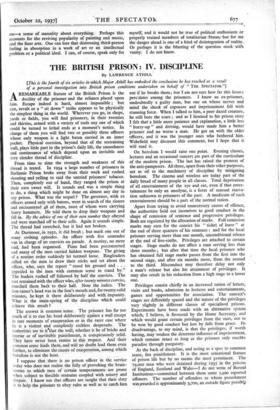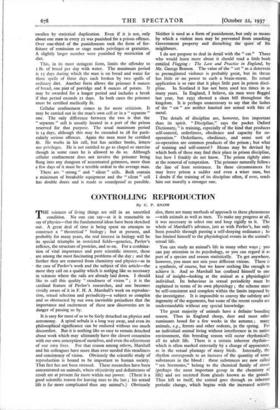THE BRITISH PRISON : IV. DISCIPLINE
By LAWRENCE ATHILL
[This is the fourth of-six articles in which Major Athill has embodied the conclusions he has reached as a result of a personal investigation into British prison conditions undertaken on behalf of `-` THE SPECTATOR.1 A REMARKABLE feature of the British Prison is the docility of the prisoner and the reliance placed upon him. Escape indeed is hard, almost impossible ; but riot, revolt or a " sit down " strike appears to be physically the simplest thing in the world. Wherever you go, in shops, yards or fields, you will find prisoners, in their twenties and thirties, armed with a variety of tools any one of which could be turned to lethal ends at a moment's notice. In charge of them you will find two or possibly three officers whose only weapon is a light baton carried in an inner pocket. Physical coercion, beyond that of the restraining wall, plays little part in the prison's daily life, the smoothness and continuance of which depend upon an invisible and very slender thread of discipline.
From time to time the strength and weakness of this thread is tested. In 1934 a large number of prisoners in Barlinnie Prison broke away from their work and rushed shouting and yelling to raid the untried prisoners' tobacco. Then, completely out of hand, they ranged the prison at their own sweet will. It sounds and was a simple thing to do, a thing which might be done on almost any day in any prison. What was the sequel ? The governor, with to officers armed only with batons, went in search of the rioters and encountered 48 of them, most of whom were carrying heavy hammers. He told them to drop their weapons and fall in. By the advice of one of their own number they obeyed and were marched off to their cells. Again it sounds simple. The thread had stretched, but it had not broken.
At Dartmoor,, in 1932, it did break ; but mark one out of many striking episodes. An officer with five comrades was in charge of 90 convicts on parade. A mutiny, no mere raid, had been organised. Plans had been preconcerted and many of the men carried hidden weapons. The giving of a routine order suddenly let turmoil loose. Ringleaders called on the men to draw their sticks and set about the officer, who, says the report " stood his ground and . appealed to the men with common sense to stand by." The leaders rushed off 'followed by half the convicts. The rest remained with the officer who, after twenty minutes exercise, marched them back to their hall. Note the italics. The lion-tamer's head was in the lion's mouth and, for twenty solid minutes, he kept it there deliberately and with impunity. What is the main-spring of the discipline which could achieve this result ?
The answer is common sense. The prisoner has far too much of it to run his head deliberately against a wall except in rare moments of exasperation or in the rarer case where he is a violent and completely reckless desperado. The authorities see to it that the wall, whether it be of bricks and mortar or of inevitable punishment, is conspicuously solid. They have never been remiss in this respect. And their common sense leads them, and will no doubt lead them even further, to eliminate the causes of exasperation, among which boredom is not the least.
I suppose that there is no prison officer in the service today who does' not realise the folly of provoking the brain- storms to which• men of certain temperaments are prone when subject to forcible restraint coupled with misery and despair. I know too that officers are taught that their duty is to help the prisoner to obey rules as well as to catch him out if he breaks them; but I am not sure how far this lessoa perc)lates among the prisoners. I know an ex-prisoner, undoubtedly a guilty man, but one on whose nerves and mind the shock of exposure and imprisonment fell with stunning force. When I talked to him, a poor dazed creature, he still bore the scars ; and as I listened to his prison story I felt that a little more patience and explanation, a little less " hurry-up " and driving, would have made him a better prisoner and no worse a man. He got on with the older officers, and it was the younger ones who bothered him. -Wakefield may discount this comment, but I hope that it will read it.
On boredom I would raise one point. Evening classes, lectures and an occasional concert are part-of the curriculum of the modern prison. The last has raised the protests of the anti-pamperers. All three, apart from their other purposes, act as oil to the machinery of discipline by mitigating boredom. The cinema and wireless are today part of the daily bread of many people in all classes. Total deprivation of all entertainment of the eye and ear, even if that enter- tainment be only an anodyne, is a form of sensual starva- tion unknown to prisoners of the past. A modicum of such entertainment should be a part of the normal ration.
'Apart from trying to avoid unnecessary causes of offence, the authorities hold out incentives to good conduct in the shape of remission of sentence and progressive privileges. Both are regulated by the allocation of marks. Full remission marks may earn for the convict his " ticket of leave " at the end of three quarters of his sentence ; and for the local prisoner serving more than one month, unconditional release at the end of five-sixths. Privileges are attached to certain stages. Stage marks do not affect a man serving less than three months ; but after that time the local prisoner who has obtained full stage marks passes from the first into the second stage, and after six months more, from the second to the third. Misconduct may therefore delay not only a man's release but also his attainment of privileges. It may also result in his reduction from a high stage to a lower one.
Privileges consist chiefly in an increased ration of letters, visits and books, admission to lectures and entertainments, games and opportunities for association. The convict's stages are differently spaced and the nature of the privileges vary slightly in different classes of specialised prisons. Experiments have been made with an alternative system which, I believe, is favoured by the Home Secretary, and which would grant certain privileges from the start, not to be won by good conduct but lost by falls from grace. Its disadvantage, to my mind, is that the privileges, if worth having, may weaken the deterrent influence of imprisonment, which remains intact as long as the prisoner only reachts paradise through purgatory.
At the back of discipline, and acting as a spur to common sense, lies punishment. It is the most sensational feature of prison life but by no means the most prominent. The 79,000 men who were detained during 1935 in the prisons of England, Scotland and Wales—I do not write of Borstal Institutions—committed between them some 5,900 reported offences. The number of offenders to whom punishment wisftwarded is appioximately 3,700, an outside figure possibly swollen by statistical duplication. Even if it is not, only about one man in every 22 was punished for a prison offence. Over one-third of the punishments took the form of for- feiture of remission or stage marks privileges or gratuities. A slightly larger number were punished by restriction of diet.
This, in its most stringent form, limits the offender to lb. of bread per day with water. The maximum period is 15 days during which the man is on bread and water for three spells of three days each broken by two spells of ordinary diet. Another form allows the prisoner 8 ounces of bread, one pint of porridge and 8 ounces of potato. It may be awarded for a longer period and includes a break if that period exceeds 21 days. In both cases the prisoner must be certified medically fit.
Cellular confinement comes in for more criticism. It may be carried out in the man's own cell or in a " separate " one. The only difference between the two is that the " separate " cell is usually located in a part of the prison reserved for that purpose. The usual maximum period is 14 days, although this may be extended to 28 for parti- cularly serious offences. Again the man must be certified fit. He works in his cell, but has neither books, letters • nor privileges. He is not entitled to go to chapel or exercise though in some cases he is allowed to do so. Although cellular confinement does not involve the prisoner being flung into any dungeon of accentuated grimness, more than a few days of it must be a terrible ordeal to the average man.
There are " strong " and " silent " cells. Both contain a minimum of breakable equipment and the " silent " cell has double doors and is made as soundproof as possible. Neither is used as a form of punishment, but only as means by which a violent man may be prevented from smashing Government property and disturbing the quiet of his neighbours.
I do not propose to deal in detail with the " cat." Those who would learn more about it should read a little book entitled Flogging : The Law and Practice in England, by Mr. George Benson. The value of the " cat " as a deterrent to premeditated violence is probably great, but its threat has little or no power to curb a brain-storm. Its actual application is so rare that it plays little part in prison disci- pline. In Scotland it has not been used ten times in as many years. In England, I believe, six men were flogged last year, but 1935 showed a clean bill throughout the kingdom. It is perhaps unnecessary to say that the lashes of the " cat " are neither knotted nor armed with bits of metal.
The details of discipline are, however, less important than its spirit. " Discipline,", says the pocket Oxford Dictionary, " is training, especially of the kind that produces self-control, orderliness, obedience and capacity for co- operation." Orderliness, obedience, and some sort of co-operation are common products of the prison ; but what of training and self-control ? Means may be devised by which both of these may find their place in prison discipline, but how I frankly do not know. The prison rightly aims at the removal of temptation. The prisoner naturally follows the line of least resistance. In these circumstances he may leave prison a sadder and even a wiser man, but I doubt if the training of its discipline often, if ever, sends him out morally a stronger one.































































 Previous page
Previous page